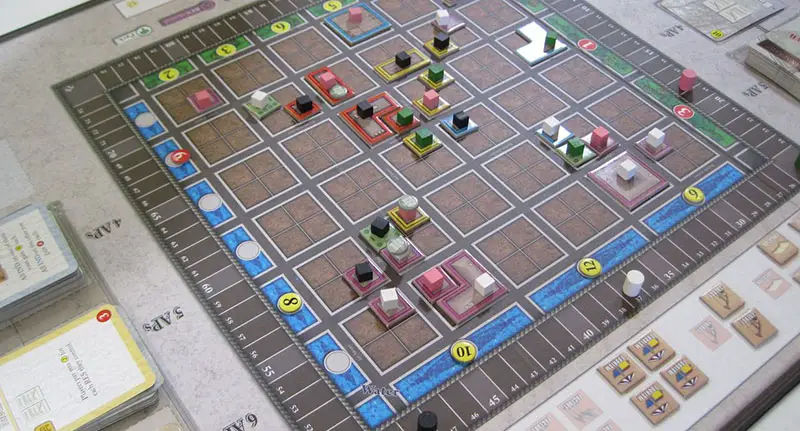
The Golden Rule
If the text of a card or tile contradicts a rule within this booklet, the card/tile effect always takes precedence.
Examples include: the Warehouse allowing a player to possess two Favors at once; or the Municipal Court allowing a player to win an election.
Short Payments & Losses
-
Mandatory: If a card or tile effect calls for a mandatory payment or loss of more wealth or more prestige than a player currently possesses - for example, losing 3 wealth to the Luxury Taxes event; or paying 2 wealth to the Treasurer - that player pays/ loses what he can and ignores the remainder.
-
Optional: Conversely, if a card or tile effect allows for an optional payment or loss of wealth or prestige - for example, choosing whether to pay 9 wealth during the Estate Auction event or 3 Prestige during the Urban Decay event - the payment/loss can't be made unless that player possesses at least the full amount.
The Active Player Is in Control
-
Breaking Ties: The active player breaks ties whenever a tiebreaker isn't explicitly given.
For example when choosing the single most valuable building during the Local Headlines event if more than one building occupies the most valuable block; or when choosing the single least valuable building during Urban Decay if two or more are tied for this distinction.
-
Choosing Player Order: When multiple players have to make decisions due to a card effect.
For example, whether to pay wealth or prestige for each of your residences when somebody builds the Marina; or whether or not to lose a building to Flood, Fire or Earthquake - the active player is free to choose the order in which affected players must make their decisions.
Public Knowledge
A player's planning cards, favor, politicians, Contractor, vocations, wealth on hand, and prestige total are always public knowledge to all players.
Personal Property
A player's planning cards, favor, politicians, Contractor, vocations, wealth, prestige, and APs are theirs only. These items cannot be given away, taken from or traded to another player unless a rule, card, or tile effect explicitly allows it.
Depleted Decks
It's possible for one or more of the contract decks to run out of cards:
If The Town Deck Is Depleted-The 5 AP space no longer refills.
If The City Deck Is Depleted-The 4 AP space once again refills with Town cards.
If Both the Town and City Decks Are Depleted-The 5 AP and 4 AP spaces no longer refill.

Long & Short Game Variants
Players desiring a longer or shorter game can do the following:
Longer Game
When setting up each of the three contract decks, shuffle the deck then split it into four piles of 9 cards each. Put the first pile on the board in its appropriate space.
Shuffle the removed event into the next nine cards and place it on the stack. Place the other two piles atop the stack.
Shorter Game
When setting up each of the three contract decks, shuffle the deck then split it into four piles of 9 cards each. Put the first two piles on the board in its appropriate space.
Shuffle the removed event into the next nine cards and place it on the stack. Place the last pile atop the stack.
End of Turn Procedure
Once the active player has spent his allotted APs - or he cannot afford to spend any more; or chooses not to spend any more - his turn ends. At the end of every player's turn, perform the following reset actions in the order given:
-
Slide face-up planning cards along the rail line - from the top of the deck towards the 1 AP box - in order to fill any boxes that were emptied during the turn.
-
Refill empty planning boxes one at a time by drawing off the top of the Planning deck. If a revealed card is an event, execute that event then draw again. Once a Build Permit or Urban Renewal is revealed perform its election and/or wealth payout, if any.
-
If face down, flip the top card of the Planning deck face up. If the card is an event, execute that event then reveal the next card. Once a Build Permit or Urban Renewal is revealed perform its election and/or wealth payout, if any.
-
Slide face-up contract cards along the rail lines - from the top of the active decks towards the 1 AP box - in order to fill any boxes that were emptied during the turn.
When the Town deck is the only active deck (as is the case at the start of the game), Town cards will slide along all five contract boxes.
When the City deck becomes active, Town cards will be limited to only the 5 AP box; City cards will slide along the 4 AP, 3 AP, 2 AP and 1 AP boxes.
When the Metropolis deck becomes active, Town cards will continue to be limited to the 5 AP box and City cards will now be limited to only the 4 AP box; Metropolis cards will slide along the 3 AP, 2 AP and 1 AP boxes.
-
Refill empty contract boxes one at a time by drawing off the top of the nearest linked - and active - con- tract deck. If an event is revealed, execute the event and draw again. Once a contract is revealed perform its prestige payout, if any.
-
If face down, flip the top card of the Town deck face up. If an event is revealed, execute the event and reveal the next card. Once a contract is revealed perform its prestige payout, if any.
-
Repeat step 6 for the City deck if it is active.
-
Repeat step 6 for the Metropolis deck if it is active.
-
Pass the Active Player tile clockwise to the next player, who then begins his turn.
Continue Reading


